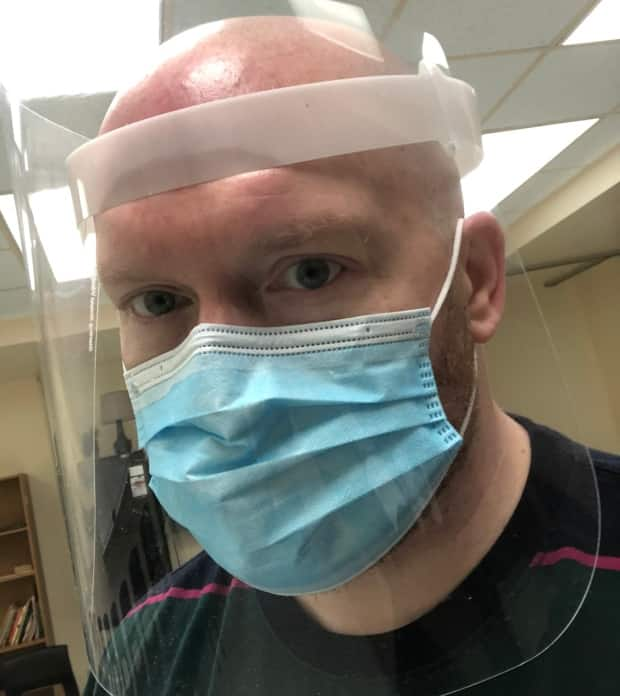Back to school for many N.L. students, with stricter rules for masks

Wednesday's return to school for thousands of students and teachers in parts of Newfoundland and Labrador prompted a swirl of emotions, from anxiety to gratitude.
"I'd be lying if I said I wasn't a little anxious. but I would also be lying if I said I didn't take a little bit comfort in knowing that we are all in this together," said Jordan Stringer, a teacher at Corner Brook Regional High.
"We are all just wading through the unknowns together."
Regions outside the Avalon moved to Alert Level 4 on Friday, which meant students could return to schools, after a brief stint of online-only learning.
Chief Medical Officer of Health Dr. Janice Fitzgerald moved the province to Alert Level 5 on Feb.12, prompting schools to close and learning to move online.
The Avalon region remains in Alert Level 5, and schools remain closed. Fitzgerald has said she will review whether the level can change, and will update the public on March 12.
Kaden Gill, a Grade 11 student at Corner Brook Regional High, said while he is happy to see his friends, it's still a precarious situation.
"It feels good to see them but its also pretty dangerous at the same time, because if we hit Level 5 again, it's a big ol' mess," he told CBC News on Wednesday.

Stringer said there is a "different vibe" in the school this week, but social and emotional wellness is top of mind for all teachers and staff.
He praised the students for navigating an uncharted path amid the COVID-19 pandemic.
"They have been truly truly exceptional.… They have been just as kind and understanding to us as staff as, I think and I hope, we have been to them," he said.
Students question mix of in-person, solo learning
Some classes at 50 schools — 28 in central Newfoundland, 20 in western Newfoundland and two in Labrador — cannot adhere to the updated health and safety protocols for cohorts and physical distancing. Students in those schools will alternate between in-class instruction and assigned work done at home without direct instruction from a teacher.
The situation is "not ideal," admitted Newfoundland and Labrador English School District CEO Tony Stack at a media briefing last week when the change was announced.
Several students told CBC News they are unhappy with the hybrid model.
Laura Adams, a Grade 12 student at Gander Collegiate, said the split scenario doesn't cover as much educational ground.
"I don't feel like we're going to get the quality of the instruction," she said.

Adams plans to study medical sciences at Dalhousie University next year, and so completing math, chemistry and biology courses this year is a must.
She said her teachers in those subjects have been "amazing," but she feels Newfoundland and Labrador wasn't as prepared overall for online learning as other provinces, including Ontario.
Landon Burry, a Grade 12 student at Gander Collegiate, is also heading to Dalhousie University next year.
Burry said he wishes classes had remained fully online until all students could return to the classroom, rather than using a hybrid system.
"Everyone was set up with Chromebooks. No one was at a deficit with [online learning].… Anyone who was trying was doing well," he said.
He isn't convinced that all of the curriculum will get covered under the split model.
"I still think we should be online so all of us can get 100 per cent of the information.… Right now we want to prioritize our education over everything else, but I just don't know how its going to work and get all the material down," Burry said.

The district insisted the full curriculum will be covered.
"While students may be attending school in person approximately 50 per cent of the time, they will be provided with followup work and activities that expand on the learning covered while they were in attendance. All curriculum outcomes are still expected to be covered," reads a statement from a district spokesperson to CBC News.
"An example: students might interact with new material (videos, readings) at home first, as preparation in advance of the face-to-face time where their teacher can be responsive to learning needs identified and have more active learning — like discussions or project work in presence of the teacher 'coach.'"
New PPE rules
Students and teachers are returning to classrooms with stricter rules in place to curb the spread of COVID-19, including the more contagious variant.
All school staff have to wear a disposable, non-surgical, three-ply mask and eye protection — such as a face shield — at all times when in the classroom and when two-metre physical distancing cannot be maintained.
Students in grades 4 to 6 have to wear a mask while seated in class and on the school bus.
Students in kindergarten through Grade 3 are expected to wear a mask at all times on the school bus and are encouraged, but not required, to wear a mask during the school day.
Students can take off the mask when they're eating or taking part in physical education classes.

 Yahoo Movies
Yahoo Movies 